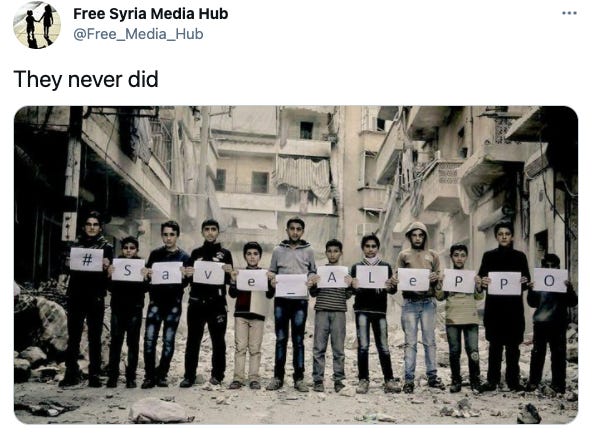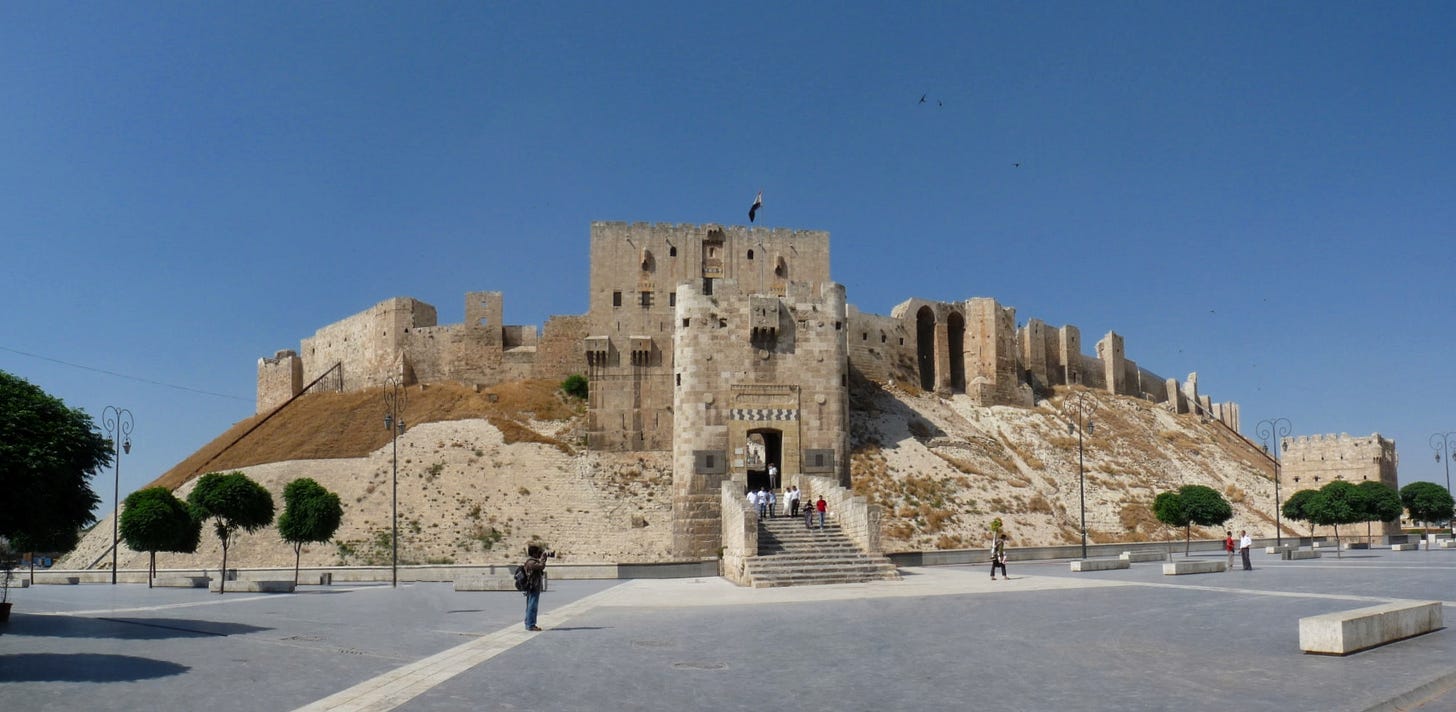Aleppo: What If A City Was Destroyed And No One Knew About It?
If it's not on CNN or MSNBC every day, did it even really happen?
It was the spring of 1985. I was just out of college and teaching at a private American boarding school in Cyprus. During Spring Break, my then-wife and I traveled with a couple of companions to Jordan and Syria. Just a couple of years out of college and still getting used to my first international experience, being in the Middle East was a dream come true. I’d long maintained an interest in the region's history, so actually being there and seeing the history I’d studied and read about was pretty amazing for a small-town kid from northern Minnesota.
I could write several pages about our time in Jordan. Petra, the Dead Sea, and our visit to the beginning of the road to Damascus would’ve made our travels pretty special if we’d limited our trip to seeing Jordan.
The most impactful part of our trip, though, was the time we spent in Syria. I’d never spent time in a police state, and at that time, as it is now, Syria was a brutally repressive dictatorship. The larger-than-life visage of President Hafez al-Assad, Syria’s leader for life, was everywhere- on the sides of buildings, in train stations, in restaurants, hotels, and stores. There was almost literally nowhere Assad’s malevolent mug wasn’t shining down on Syrians going about their business.
Beyond Assad’s visual presence, the presence of the Syrian secret police was even more ever-present and oppressive. We stood out as obvious foreigners at a time when few non-Arabs traveled in Syria. For the first time in my life, I couldn’t do, go, or say what I wanted. My words and/or actions could easily have had adverse repercussions for others, so I quickly learned to be conscious of my surroundings and who was nearby. I couldn’t assume anything, so I learned to be suspicious of everything.
I didn’t understand it at the time, but this skill would serve me well in some of my future travels.
Once I accepted the realities of being in a police state, it became easier to enjoy myself. For example, I became fascinated with and mesmerized by the Muslim call to prayer that occurred several times a day. Early in the morning, I’d lean out my hotel window and watch the minarets light up across Damascus as the call to prayer echoed from one side of the city to the other. Once the call ended, the lights in the minarets would extinguish, and life would resume until the next call to prayer.
After a few days in Damascus, we took a bus north to Aleppo. The six-hour bus ride skirted the Lebanese border, which, since the civil war in Lebanon was in one of its most deadly periods, was of no small concern. Fortunately, we made it to our first stop in Hama without incident, but something else caused me concern once we arrived.
Most tourists came to Hama for the Roman water wheels, which at the time were (and still are) considered some of the finest remaining examples of Roman hydrologic technology. What most didn’t realize was that less than a year earlier, the Syrian Army had sealed off roughly a quarter of Hama, brought in heavy artillery, and shelled that section of the city brutally to root out what they suspected to be the Muslim Brotherhood. Amnesty International estimated that roughly 10,000 people were killed, most of them civilians and non-combatants. Independent confirmation of the presence of the Muslim Brotherhood has never been obtained.
I knew this at the time we stopped in Hama, and I was nervous. I didn’t know what to expect, because I didn’t know the current situation in the city. We played tourist and enjoyed the Roman water wheels. They were as impressive as advertised…and then we boarded the bus and left without incident.
A couple of hours later we were in the ancient city of Aleppo. If Damascus was Syria’s Paris, then Aleppo was its El Paso- dusty, hot, a bit disorganized- and I loved everything about it. We found a hotel- $5.00 a night and a few cockroaches thrown in at no extra charge- and we settled in for the night.
I woke up early the next morning and decided to go for a walk. When I stepped outside our hotel, I stopped, closed my eyes, and just listened. Nothing I experienced in that moment was even vaguely familiar or recognizable. I was halfway around the world…and yet I could have been on another planet.
It was one of the most deliriously joyous moments I’ve ever experienced.
Over the next few days, we visited museums, mosques, restaurants, shops, and Aleppo’s souq, where the smell of spices transported me to places I’d never been to before.
I spent time exploring Aleppo’s citadel. I clambered over the ramparts, wondering if I could see into Turkey 35 miles away (almost, but not quite). In its day, I imagine it must have been an impressive and difficult to breach military installation.
It didn’t take long for me to fall in love with Aleppo. It was rough around the edges. It didn’t have an upper class eschewing Arabic for French. And it felt like a city caught between a difficult past, a problematic present, and a decidedly bleak future.
There was no way I could have known then just how accurate that feeling would prove a quarter-century later.
One of the oldest continuously inhabited cities in the world, Aleppo may have been inhabited as far back as the sixth millennium, B.C. Its long history is attributed to its strategic location between Mesopotamia and the Mediterranean Sea. Aleppo was once a major economic and trading center, but its power and influence began to fade in the 16th and 17th centuries as silk production in Iran faded. In addition, the opening of the Suez Canal in 1869 meant that Aleppo’s role as an outpost on the overland trade route between Asia and Europe was no longer of great relevance.
The Aleppo I encountered was definitely on the back end of the historical bell curve, but it still managed to get its hooks into me. We were only in Aleppo for four days, but I left knowing I wanted to come back. Of course, traveling to Syria then wasn’t easy…and it wouldn’t get any easier over time. The country’s political system would continue to deteriorate over time, taking its economy with it. By the turn of the 21st century, Syria was a country held together by repression and fear…until not even that could maintain what passed for order.
When the Syrian Civil War began in 2011, it wasn’t long before Aleppo became embroiled in the conflict. The government gave no quarter in a brutal and futile effort to maintain control of the city. As a result, Aleppo became, and remains today, a city torn apart and barely recognizable as Syria’s formerly most populous city (4.6 million in 2010).
When I left Aleppo, it was with the promise I made to myself that I’d return someday to spend more time exploring what I’d eventually come to describe (and still do) as one of my favorite places in the world. However, once the Syrian Civil War came to Aleppo, I knew immediately that the city I’d once fallen for would soon exist only in my memory.
In early 2012, Syrian government forces began bombing Aleppo in hopes of quelling a growing uprising. Instead, as anti-government resistance increased, fighting within the city grew into some of the war’s fiercest bombings and most devastating house-to-combat.
By the spring of 2013, the Syrian army had established control over the western party of Aleppo even as anti-government rebels held the eastern part of the city. That stalemate remained in place until late 2016 when the Syrian army re-established control over Aleppo.
What that terse description omits is the intense damage and suffering inflicted upon the population of Aleppo. It also doesn’t do justice to the entire neighborhoods reduced to rubble by artillery, barrel bombs, and years of brutal house-to-house combat. Nor does it begin to describe the thousands of dead and wounded, many of them non-combatants.
The result is a city that no longer looks anything like the metropolis whose charms thoroughly infatuated me so many years before. For most Americans who saw reports of the war in Aleppo on their televisions, the reports were sad if rather abstract. For me, they were decidedly and acutely personal. I’d spent only a few short days in Aleppo when I was an impressionable young man, but those days changed my life. I’d left hoping to someday have an opportunity to revisit Aleppo and compare my memories to the reality of the present day.
Once the Syrian Civil War started, I knew there was no chance I’d ever see Aleppo in anything approaching its former glory. The city I fell in love with once upon a time had been reduced to rubble. Anyone who could leave had already long since decamped for safer destinations, leaving the debris to the soldiers and the rats.
What if a city was destroyed by years of senseless civil war and no one noticed? That’s what happened to Aleppo…and it saddens me more than I can find words to express my sorrow adequately.
Bertrand Russell once said that war doesn’t determine who’s right or wrong…only who’s left. Unfortunately, in Aleppo’s case, not only is it difficult to determine right or wrong, there’s barely enough left for it even to matter.
If you enjoyed reading this, please consider sharing it with a friend or six you think might similarly enjoy reading it. If you REALLY enjoyed it, please considered subscribing or donating on Venmo. My handle is @Jack-Cluth. Thank you!!






